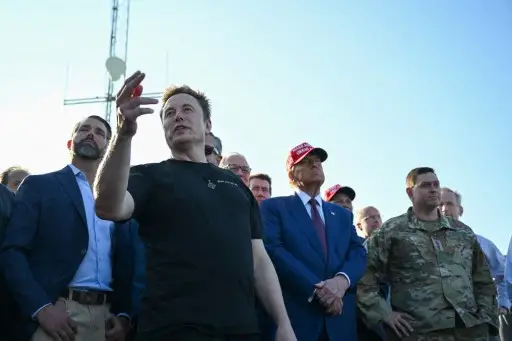WASHINGTON, D.C. (Reuters) – In a bold new venture, Elon Musk and Vivek Ramaswamy are taking on the U.S. federal government, with plans to reshape its spending and operations. The two business leaders, known for their entrepreneurial success, have teamed up to lead the newly formed Department of Government Efficiency (DOGE), a strategic initiative aimed at slashing government regulations and expenditures.
Musk, who heads Tesla, SpaceX, and X (formerly Twitter), is no stranger to disruption. In an op-ed for the Wall Street Journal, he outlined his vision for reducing the bloated government bureaucracy, calling it an “existential threat” to U.S. democracy. He emphasized the need for sweeping cuts to federal spending, with a particular focus on areas such as public broadcasting, international aid, and regulatory burdens that stifle innovation and growth.
“Government efficiency is no longer a luxury, it’s a necessity,” Musk stated. “We intend to remove the red tape that hinders progress and implement systemic changes that will free up resources for more important areas of national growth.”
Ramaswamy, a former biotech entrepreneur and staunch Trump ally, will work closely with Musk on this ambitious project. The duo has pledged to function as volunteer advisors, not government employees, making it clear that their goal is not to hold positions of power, but to enact meaningful reform. Together, they will identify and review regulations for elimination, aiming to reduce the U.S. government’s regulatory framework.
While the Department of Government Efficiency is not expected to be a formal government department, its influence could be far-reaching. Musk and Ramaswamy have proposed that President Trump use executive powers to nullify unnecessary regulations, cutting through the bureaucratic process and ensuring faster implementation of changes. The two business leaders argue that their approach will correct what they see as an “executive overreach” created by regulatory bodies acting without Congressional approval.
As part of their proposed overhaul, they have set an ambitious target of reducing federal expenditures by more than $500 billion, a process that would likely involve significant cuts to the federal workforce and agency operations. However, they have acknowledged that such moves will undoubtedly face resistance, both from within the political establishment and in the form of legal challenges.
Despite potential pushback, Musk and Ramaswamy are optimistic that the conservative majority in the U.S. Supreme Court, now at 6-3, will back their agenda. They see this as a historic opportunity to reshape the federal government’s structure, making it leaner and more efficient.
“Our goal is to make DOGE unnecessary by July 4, 2026,” Musk said. “If we succeed, there will be no need for us to continue. The job will be done.”
The new initiative has sparked both intrigue and skepticism, particularly around the potential conflicts of interest arising from Musk’s vast business interests and government dealings. His companies, which rely on government contracts and regulatory approvals, may face scrutiny as the initiative unfolds.
Still, the partnership between Musk and Ramaswamy represents a merging of business acumen with political ambition, and their efforts to reform government operations could have far-reaching implications for the future of U.S. governance.

